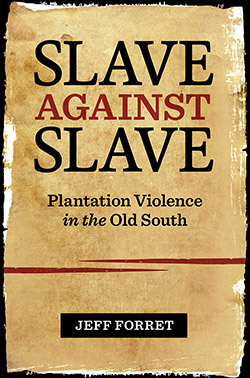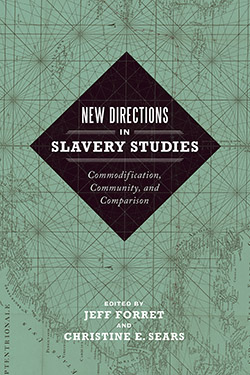Forthcoming books by Forret expand slavery dialogue
 Jeff Forret, professor of history at Lamar University, has two books being published in November by LSU Press: Slave Against Slave: Plantation Violence in the Old South and New Directions in Slavery Studies.
Jeff Forret, professor of history at Lamar University, has two books being published in November by LSU Press: Slave Against Slave: Plantation Violence in the Old South and New Directions in Slavery Studies.
Slave Against Slave provides a new look into antebellum slave communities. The idea for Slave Against Slave grew out of Forret’s first book, Race Relations at the Margins. While researching violence between slaves and poor whites for the latter, he found that while ample literature about southern white violence existed, researching violence between slaves turned up little.
“Since the book I needed to read didn't exist, I set out to write it myself,” Forret said. “I started research in 2005, so [Slave Against Slave] was a decade in the making.”
Often interpreted as communities of solidarity and intraracial peace, Forret instead gives an alternative view by examining the internal strife and violence slave communities sometimes faced. The book also examines how slaves, slave masters, churches and laws kept violence in check.
 “The slave community paradigm had emerged in the early 1970s to counter earlier portrayals of slaves as little more than objects of white treatment, but scholars then veered in the opposite direction, painting the slave quarters as artificially harmonious and devoid of conflict,” he said. “So what scholars did was trade one caricature of slave life that dehumanized those held in bondage for another caricature of slave life that, though more positive, was no less dehumanizing.”
“The slave community paradigm had emerged in the early 1970s to counter earlier portrayals of slaves as little more than objects of white treatment, but scholars then veered in the opposite direction, painting the slave quarters as artificially harmonious and devoid of conflict,” he said. “So what scholars did was trade one caricature of slave life that dehumanized those held in bondage for another caricature of slave life that, though more positive, was no less dehumanizing.”
Forret also analyzes the ways in which personal and work disputes, marital disputes or affairs, tarnished honor, debt and status difference within the slave quarters fueled intraracial slave violence prior to the onset of the Civil War.
Pulling information from primary sources like court records, slave narratives, travelers’ accounts and slaveholders’ journals Forret hopes in his book not to dismiss the dominant ideas of slave resilience and solidarity, but to rather “strike a better balance” by giving a more nuanced understanding of slave life and culture.
“Not finding any unusually high levels of violence among slaves, I instead used violence as a lens for understanding slave life and explored the motivations for the conflict that did exist,” he said.
 In Forret’s forthcoming anthology New Directions in Slavery Studies, co-edited by Forret and University of Alabama professor Christine E. Sears, essays from 12 contributors highlight three major themes in the field of slavery studies: commodification, community and comparison.
In Forret’s forthcoming anthology New Directions in Slavery Studies, co-edited by Forret and University of Alabama professor Christine E. Sears, essays from 12 contributors highlight three major themes in the field of slavery studies: commodification, community and comparison.
The anthology brought together Forret, Sears, and a handful of other historians partially as a way to honor Forret’s dissertation advisor Peter Kolchin, the Henry Clay Reed Professor of History at the University of Delaware and Bancroft Prize winner.
“Peter is among the leading scholars of slavery alive today,” Forret said. “I redirected my energies toward editing a focused anthology of slavery that a number of his students (including Sears) could contribute to, but that invited others influenced by Peter's work into as well.”
New Directions in Slavery Studies also “addresses the various ways in which the institution of slavery reduced human beings to a form of property…[and] provides new examinations of the lives and histories of enslaved people in the United States” according to LSU Press.
Slave Against Slave and New Directions in Slavery Studies will be Forret’s third and fourth books after Race Relations at the Margins: Slaves and Poor Whites in the Antebellum Southern Countryside (LSU Press, 2006) and Slavery in the United States (Facts on File, 2012).
A social historian specializing in southern history and slavery, Forret joined Lamar University in 2005. In addition to U.S. history surveys, Jeff Forret teaches courses on the Old South, slavery, colonial America, the early republic, antebellum America and race and sex in American history, among others. Forret serves as the graduate director for the history department.
In the meantime, Forret continues his research on Williams’ Gang: A Slave Trader, His Cargo, and Justice in the Old South, an upcoming legal history of the domestic slave trade as viewed through Washington, D.C. slave trader William H. Williams, who operated a slave pen within sight of the U.S. Capitol. He is also actively working on Empires of Slavery: The United States, the Netherlands, and Human Bondage, 1814-1863, which looks at U.S.-Dutch relations through the lens of slavery leading up to our Civil War, which left 1.2 million dead or wounded while the Dutch concurrently abolished slavery peacefully.


